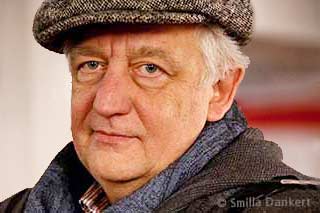Astonishingly, a political scientist has developed the platform which today gives online teaching its basis at universities worldwide (and in many cases makes teaching during the corona pandemic possible in the first place). But that's not even all: Wolfgang Leidhold, social scientist, graduate philosopher and East Asia scholar, can point to a successful career in the field of painting, too. After his artistic training with Hans-Jürgen Schlieker, Wolfgang Leidhold had various group and solo exhibitions, among others in Cologne, Munich, Bochum and New York. It is therefore hardly astonishing that he has also a differentiated attitude towards the digitalisation of teaching.
to the first part of the interview with Prof. Dr Wolfgang Leidhold: "All of them were pioneers"
Dear Professor Leidhold,
Platforms like ILIAS have made it possible for many educational institutions, schools, and universities to maintain some form of normal teaching during the pandemic. On this basis, do you believe that the Covid-19 pandemic can or will have a lasting impact on the digitalisation of teaching?
Wolfgang Leidhold: It was already clear to us 25 years ago that digitisation would bring about social change. It's good that we already had these tools and don't have to start developing net-based learning software from scratch now.
Was the digitalisation of teaching important to you even before?
Wolfgang Leidhold: Since its very beginning, I was fascinated by computing. So in the eighties I learned Unix and Fortran 77, and the basics of programming. In my department at Erlangen University, I was the first to own a computer, an Atari 520ST, then an Apple Mac IIc, on which I wrote my thesis.
What advantages and what disadvantages do you see in the digitisation of teaching?
Wolfgang Leidhold: Computers and the internet are one class of tools among many others, such as the book and the notepad. Compared to the book, digital instruments have a much greater reach, as they are cost effective, and we communicate and cooperate globally. However, the flat screen means that you are working within a two-dimensional world: proximity and distance are irrelevant. Everything is immediately present. In this flat universe, the many dimensions of experience wither away in the long run. Man is a social being in space and time. Therefore we have our senses, feelings, empathy, reason, and a sense of order. The order in space and time creates sense and priorities.
How would you design an optimal ratio of classroom teaching and digital teaching?
Wolfgang Leidhold: The direct contact from person to person is irreplaceable. This is the feedback I still get from students. After the invention of modern letterpress printing, no one came up with the idea of abolishing schools and universities just because you could now read everything everywhere. Just as you used to combine books and seminars, today you have to combine books, digital medias and classroom teaching. In short: in-person teaching combined with digital tools for learning. I, myself, start all my research online, switch to printed material for more in-depth study, and always write my drafts by hand. It's the mixture that does it.
Many people are afraid of rapidly advancing digitalisation in all areas and feel overwhelmed. Do you believe that political science can play a decisive role in this development, and what should it do?
Wolfgang Leidhold: Fear is a bad advisor. One should always meet challenges openly and creatively. We should encourage people to educate themselves, to rely upon their own judgment and to break new ground. Well understood political science is very much the same, it is open to the future, independent, problem-oriented. By its very nature, politics is a creative activity. Here, I particularly appreciate the political scientist Hannah Arendt and her book on the Vita Activa. I will focus my next seminar on her.
You have managed to successfully pursue a life as both a political scientist and an artist. Can you briefly give our readers an idea of how these two areas are integrated in your life (perhaps with regard to how the pluralistic concept of experience is reflected in your works)?
Wolfgang Leidhold: I would like to answer this with the motto from my Instagram page @leidholdart: Open your eyes. Open your mind. Exploring time & space & the great narratives: that's my art. The motto applies to my science as well. And both sides mutually stimulate each other.
Man is a living being that participates in reality in many experiential dimensions. If we are serious about the ideas of an open mind and an open society, it is important to actively use all these dimensions. Whoever opens their mind to and in art, also opens their mind to science, because it is always one and the same mind. I go into detail regarding these connections in my most recent book "The History of Experience," which will soon be published by McGill University Press.
If you could give students some advice, especially at this time, what would it be?
Wolfgang Leidhold: I guess the same advice as my mentors gave me: Do the things that you love. Leave well-trodden paths behind. And, don't be afraid—fear nought and nobody!
to the first part of the interview with Prof. Dr Wolfgang Leidhold: "All of them were pioneers"
